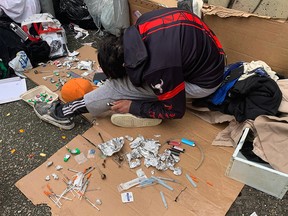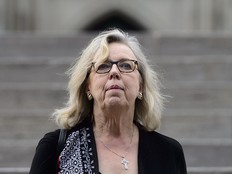Adam Zivo: So now we're going to euthanize drug addicts?
Addiction physicians and harm-reduction advocates appalled at possible expansion of Canada's MAID program

Article content
The federal government seems poised to legalize medically assisted suicide for drug users next spring — a move that addiction physicians and harm-reduction advocates are condemning as “eugenics.” Their anger is entirely reasonable, as it is appalling that we live in a country that fails to provide adequate supports to drug users, and then, in the face of the predictable suffering that ensues, offers them death instead.
While medically assisted suicide (also known as “medical assistance in dying” or “MAID”) can be a compassionate intervention in some cases, Canada’s particular guidelines have become increasingly absurd.
When the federal government first legalized MAID in 2016, access was limited to individuals who had a “grievous and irremediable” sickness or disability and whose “natural death” was “reasonably foreseeable.” This ensured that MAID was exclusively used to provide dignity and comfort to the terminally ill — something that is supported by 56 per cent of Canadians, with 28 per cent being unsure and only 16 per cent being opposed, according to an Angus Reid poll.
But then, in 2021, a “Track Two” option was added that had no requirement of a terminal illness. Through this option, disabled or incurably sick individuals could seek MAID just so long as they experienced intolerable suffering.
However, disabled people often suffer due to socioeconomic exclusion and neglect — which includes poverty and housing uncertainty. As disability payments are scandalously low throughout Canada (i.e. $1,308 per month in Ontario), vulnerable people are regularly condemned to indefinite, excruciating and entirely unnecessary hardship.
Unfortunately, Canada’s MAID system fails to distinguish between avoidable suffering caused by such neglect, versus the unavoidable suffering caused by one’s own body.
Soon after Track Two became available, reports emerged of disabled people seeking state-assisted death because they couldn’t afford housing or food. Canada had denied these individuals the bare minimum needed to comfortably survive, and then offered to simply kill them instead. Disability rights activists were understandably agitated and believed that their lives were being devalued.
The number of Canadians opting for assisted suicide rose by 31.2 per cent last year, hitting 13,241 and bringing the total since 2016 to 44,958.
Next year, the government is expected to further expand eligibility for MAID to include people whose sole underlying condition is mental illness. While this may have some valid applications (i.e. severe and deteriorating dementia), the guidelines are expected to be loose enough to permit far more contentious cases — including individuals struggling with anorexia.
Until last weekend, few people considered what impact these reforms might have on drug users. The public generally fails to conceptualize addiction as a mental illness, and, for those working in addiction, the euthanization of drug users was simply unfathomable.
But apparently some imaginations are less constrained.
At the Canadian Society of Addiction Medicine’s (CSAM) annual scientific conference last weekend in Victoria, B.C., Dr. David Martell, physician lead for Addictions Medicine at Nova Scotia Health, presented a framework for assessing MAID eligibility for drug users. “It’s not fair to exclude people from eligibility purely because their mental disorder might either partly or in full be a substance-use disorder. It has to do with treating people equally,” he said.
Shortly after, Vice News published a scathing article on Martell’s presentation and cited several harm-reduction activists who referred to his framework as “eugenics.” Shortly afterwards, the National Post’s Chris Selley wrote an opinion piece that was similarly disapproving.
In a subsequent statement to the National Post, Health Canada spokesperson Anne Génier clarified that the federal government “is not seeking to expand MAID eligibility to Canadians solely on a criteria of substance addiction.” While this means that Canada’s MAID expansion will be slightly stricter than previously believed, that does not make things much better.
Substance abuse and mental illness often go hand in hand. In 2018, the National Institute on Drug Abuse estimated that 38 per cent of individuals with substance-use disorders also have a mental illness. As this is concentrated among the severely addicted, the individuals who are most likely to seek MAID are also likely to be eligible for euthanasia due to their mental health comorbidities.
“Permitting MAID eligibility for persons with mental disorder does not mean that everyone suffering from that disorder will receive MAID,” wrote Génier, adding that, due to “stringent eligibility criteria and procedural safeguards” it is expected that “very few individuals will be found eligible for MAID on the basis of a mental disorder as the sole underlying medical condition.”
But no one is worried about MAID being available to every drug user. Critics have argued that unnecessarily euthanizing even just a small number of severely addicted users, who could otherwise seek recovery, is unacceptable.
In general, Génier’s statement conspicuously ignored how MAID safeguards have already failed to protect vulnerable people, despite the federal government previously arguing that abuse of the system would not happen. Health Canada is essentially asking us to trust them that everything will be fine, when public trust in this area has already been broken.
At the CSAM conference where Martell presented his work, I spoke with a number of other addiction experts, many of whom are quite prominent in their field. They were unanimously appalled by the idea of offering MAID to drug users and said they were unaware of any colleagues who had lobbied for it. The development had come out of the blue.
A common sentiment was that the government is absolving itself of its responsibility to fund better treatment and harm-reduction services. One physician said, darkly, that he was not surprised by the direction the Liberal government appears to be taking — it’s the cheaper and quicker option. Given the breathtaking scale of Canada’s overdose epidemic, the potential normalization of MAID as a “solution” seems like a crushing defeat.
Sarah Blyth, who runs an overdose prevention site in Vancouver and who has engaged with thousands of drug users and saved countless lives, told me in a phone call that offering MAID for addiction made her “sick to (her) stomach” and that the government should be focusing on improving drug users’ lives.
Blyth stressed that while drug users can sometimes end up in “dark places” and express self-destructive or suicidal thoughts, she has seen countless severely addicted individuals turn their lives around.
“We need to do better. We need to have affordable housing for people. We need to have a better health-care system for people. We need a better school system for youth,” she said. “We need to do better to get people out of their situation, before we even start talking about MAID, which should be the lowest of priorities.”
Blyth said she hadn’t heard of a single drug user or harm-reduction worker who had advocated for using MAID this way. “I haven’t heard from one person who thinks it’s a good idea — and I know people across the political spectrum.”
The addiction medicine world is tense these days, as experts are deeply divided on the validity of certain harm-reduction interventions. Yet at the CSAM conference, one thing became clear: the federal government had created a rare moment of unity between experts of all backgrounds and ideologies, because all of them know, with visceral certainty, that this is not the way forward.
National Post













Postmedia is committed to maintaining a lively but civil forum for discussion. Please keep comments relevant and respectful. Comments may take up to an hour to appear on the site. You will receive an email if there is a reply to your comment, an update to a thread you follow or if a user you follow comments. Visit our Community Guidelines for more information.